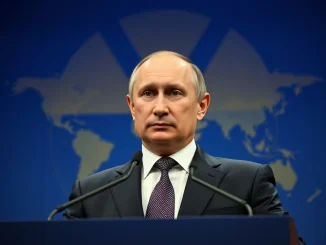
Reports emerging from Israeli media, and highlighted by financial news outlets like JinSe Finance, indicate a potentially significant development in the ongoing geopolitical landscape: Israel is reportedly targeting the underground headquarters of Iran’s Supreme Leader, Ayatollah Ali Khamenei, located in Tehran. For those following the cryptocurrency markets and broader global finance, understanding these events is crucial as they can introduce considerable Geopolitical risk and volatility.
Understanding the Reported Israel Iran Conflict Dynamics
The relationship between Israel and Iran has been marked by decades of hostility, often playing out through proxy conflicts across the Middle East. This latest report, if confirmed, represents a direct strike at the heart of Iran’s leadership structure. It elevates the tension significantly beyond previous exchanges that often involved cyberattacks, proxy forces, or strikes on military assets in other countries.
- Escalation: Targeting a supreme leader’s headquarters is a major escalation step.
- Symbolism: The location itself carries immense symbolic weight, representing the core of Iran’s political and religious authority.
- Information Source: The report originates from Israeli media, as cited by JinSe Finance, meaning official confirmation from either government is awaited and crucial for verification.
Significance of the Khamenei Headquarters Target
Ayatollah Ali Khamenei is the highest authority in Iran, holding ultimate power over the country’s domestic and foreign policies, including its military and nuclear programs. His headquarters in Tehran is not just an administrative building but the operational center for key decisions. An attack on such a location would be intended to:
Disrupt command and control capabilities.
Send a strong message directly to the Iranian leadership.
Potentially degrade infrastructure deemed critical to Iranian operations.
The report specifically mentions an ‘underground’ headquarters, suggesting a fortified location designed to withstand attacks, which aligns with the strategic importance of the target.
The Reported Tehran Attack: What We Know (and Don’t Know)
As of the initial reports disseminated by Israeli media and picked up by outlets like JinSe Finance, the details remain sparse. Key questions that remain unanswered include:
Was the attack successful, and what was the extent of the damage?
What type of ordnance or method was used?
Has Iran issued a response or confirmation?
What is the immediate aftermath on the ground in Tehran?
Given the sensitivity and potential ramifications of such an event, information is likely to be heavily controlled or disputed by both sides. Verifying the claims independently is paramount before drawing firm conclusions.
Wider Implications of Rising Middle East Tensions
A direct strike on a target as significant as Khamenei’s headquarters could have far-reaching consequences for regional stability and global markets. Increased Middle East tensions typically lead to:
Volatility in oil prices due to the region’s importance in global energy supply.
A flight to safety in traditional assets like gold and certain government bonds.
Increased uncertainty that can impact equity markets and, importantly for our audience, cryptocurrency markets.
Cryptocurrencies, while sometimes seen as uncorrelated assets, are increasingly influenced by macro-economic and geopolitical events. Major shocks like this can trigger sell-offs as investors de-risk portfolios or, conversely, drive interest in decentralized assets depending on the specific context and narrative that emerges.
Navigating Geopolitical Risk in the Current Climate
The reported attack underscores the persistent geopolitical risk emanating from the Middle East. For investors and observers, this means:
Staying informed through reliable news sources, verifying reports before reacting.
Understanding how geopolitical events have historically impacted various asset classes, including crypto.
Considering the potential for rapid shifts in market sentiment based on escalating or de-escalating tensions.
While the immediate focus is on the military and political dimensions of this event, its ripple effects are felt globally, including in the digital asset space that JinSe Finance often covers.
Conclusion: Monitoring a Developing Situation
Reports from Israeli media, relayed by outlets like JinSe Finance, claiming an Israeli attack on Ayatollah Ali Khamenei’s underground headquarters in Tehran mark a potentially critical juncture in the Israel-Iran conflict. This reported Tehran attack on the Khamenei headquarters represents a significant escalation in Middle East tensions, carrying substantial Geopolitical risk. While details are still emerging and require verification, the potential implications for regional stability and global markets are considerable. Keeping a close watch on this developing situation is essential for anyone tracking international affairs and their impact on the global financial landscape, including the volatile world of cryptocurrencies.



